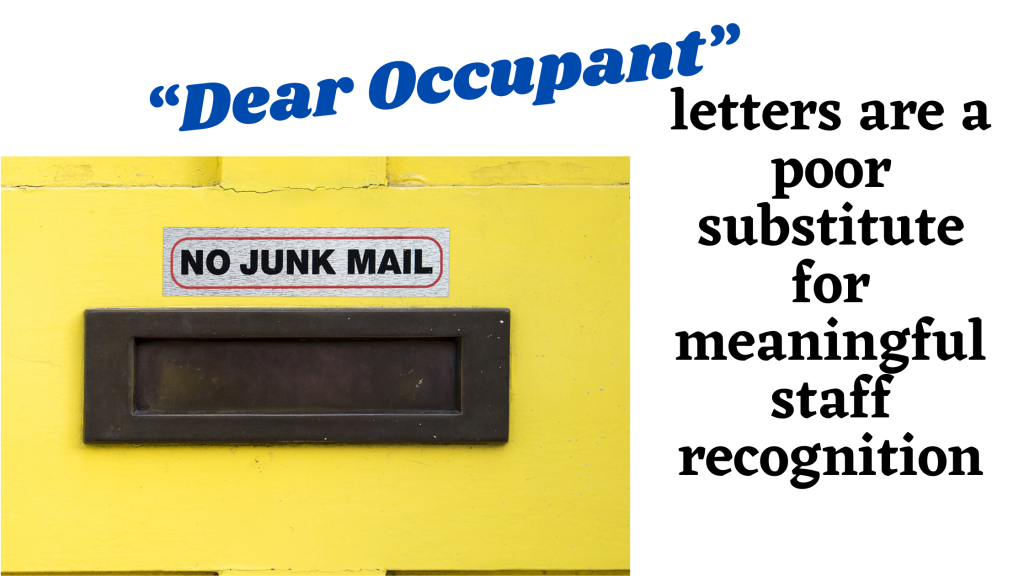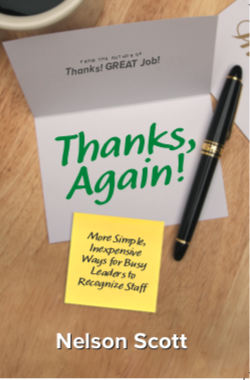Someone who knows that I am less than enthusiastic about treat-everyone-the-same service awards forwarded an email that she received from her employer.
It’s an example of a well-intended gesture that was meaningless in the eyes of the recipient.
“Look what I got for working at _______ for 10 years!” she wrote. “Yippee!”
I have omitted the name of the organization for which this individual works, because with only a few changes this letter could have been—but never should be—sent to employees of any large organization.
The letter, “to congratulate you on your 10 years of service,” bore the signatures of the CEO and chair of the board, neither of whom the recipient had ever met.
It didn’t have its intended impact. It actually demonstrates that it may be best to ignore service anniversaries rather than attempt to recognize the milestone with a form letter.
With only the name of the individual being “honoured” changed, this same letter likely went to hundreds of others who had only one thing in common. They all began working for the organization in 2013.
While the board chair and CEO are probably sincere in their wish to congratulate employees for reaching their 10-year service anniversary, what they can do is limited.
They want to express appreciation to frontline staff members for what do, but they are too far removed from the action to do so in any meaningful way.
They don’t know individual staff members or what they do. They don’t know how staff members wish to be addressed.
This letter used the recipient’s given name, which she only uses on legal documents. No one who knows her would ever dare use this name.
The recipient is thanked for “your contributions,” without any specific reference to what those contributions were. This is equivalent to thanking employees for nothing in particular. Such generalizations are evidence that the writer is either not paying attention, or was far removed from the action. (Or, worse, that they didn’t write the letter at all, merely signed copy crafted by an underling who was even less invested.)
There are ways for senior leaders such as this board chair and CEO—who understand that recognizing frontline staff is important—to ensure that the recognition that staff receives is meaningful:
First off, stop thinking you can do this. You can’t. There are too many staff members making valuable contributions every day that you aren’t there to see. Instead, set an expectation that all supervisors and managers up and down the hierarchy are responsible for acknowledging the contributions and achievements of staff on a daily basis.
Become a role model by frequently recognizing staff who report to you for what they do well. People who are recognized are more likely to recognize others.
Provide managers and supervisors with training on how to recognize staff and the resources and tools they need to do so.
During one-on-one meetings with the leaders who report to you, ask how they have recognized managers and supervisors who report to them. Encourage them to ask the same question during their one-on-one meetings with frontline leaders.
When you visit your organization’s front line, ask the leaders there if they have a message of appreciation that they would like you to deliver to individuals or teams. Prepare to deliver those messaging by asking questions to ensure that you can be specific about the contributions for which you are praising individuals or teams.
Recognize those who do a good job of recognizing others. You will be praising them for a behaviour that you want to see repeated.
And please, stop sending “Dear Occupant” letters to mark service anniversaries. They generate cynicism in the minds of staff rather than a sense of being appreciated for what they do.
==
This article relates to two themes in my new book, Thanks, Again! More Simple, Inexpensive Ways for Busy Leaders to Recognize Staff. Theme #4: Senior Executives, Frontline Staff and Recognition suggests how senior leaders can champion staff recognition throughout the organization. Theme #16: Add Meaning to Formal Recognition includes at least 15 simple, inexpensive ways to celebrate service anniversaries and other achievements. Click here to sign up to receive regular updates on my progress toward the book’s launch and you will be able to immediately download a sample from the book—Theme #6: Staff Recognition’s Number One Tool: Thank-You Notes—plus bonus content.


